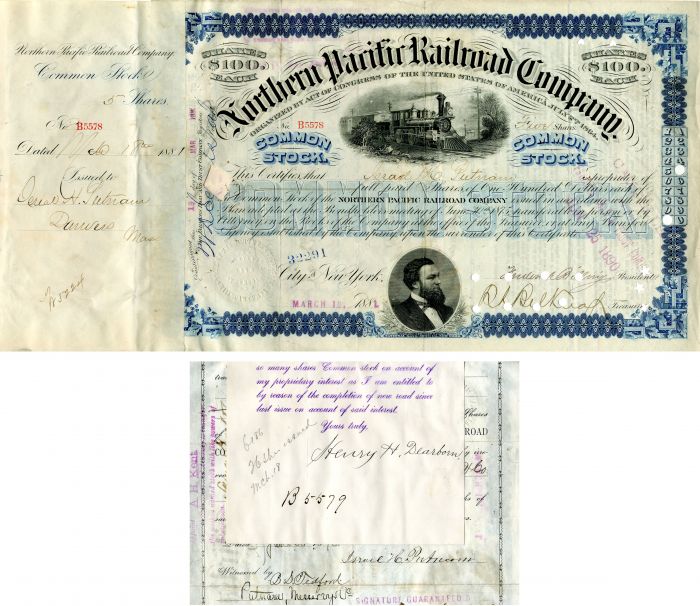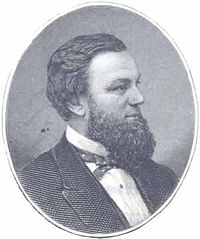Northern Pacific Railroad Co. Issued to and Signed by Israel H. Putnam - Stock Certificate
Inv# AG2287 Stock
Stock issued to Israel H. Putnam and signed on back. (Obviously a descendent of Major General Israel Putnam.) Also signed by Henry H. Dearborn and Frederick Billings. Further research necessary for H.H. Dearborn.

Israel Putnam was a political and military leader during and after the American Revolution.
He was born on January 7, 1718, in what is now Danvers, Massachusetts. In 1740, he moved to Pomfret, Connecticut, hoping to acquire land. Over the next thirty years, he became a successful farmer and also opened a tavern. He participated in the French and Indian War and was recognized for his bravery. In 1756, he became a captain in the Connecticut militia and, in 1758, was promoted to major. During the war, he was captured by the Kahnawake people. The Kahnawake wanted to burn Putnam at the stake, but the last minute intervention of a French officer saved Putnam's life.
Putnam played an important role in the disagreements between the British government and its colonies in the New World. These conflicts eventually led to the American Revolution. Known for his opposition to British taxes, Putnam won election to the Connecticut General Assembly in 1766. Around this same time, he also helped establish Connecticut's Sons of Liberty. This organization actively campaigned against the lack of colonial representation in the British government.
With the outbreak of the American Revolution in 1775, Putnam joined the Continental Army. Due to his previous military experience, Putnam was made a colonel in the army. He eventually resigned from this position to become the head of the Connecticut militia with the rank of brigadier-general. He played a major role at the Battle of Bunker (Breed's) Hill and was in charge of the troops guarding New York City before being replaced by George Washington. Putnam spent the remainder of his service in the military in minor positions. In 1779, he suffered a stroke, which left him partially paralyzed and forced him to retire from military duty. Putnam died on May 29, 1790, in Brooklyn, Connecticut.
Putnam did not have a direct connection to Ohio. His exploits, however, were well known by the settlers of the Connecticut Western Reserve in northern Ohio. Putnam County was named after this Revolutionary War hero. Israel Putnam was a cousin of Rufus Putnam, a pioneer settler in what would become the State of Ohio. Rufus Putnam helped established Marietta, the first permanent settlement by the newly established United States in the Northwest Territory.

Frederick Billings (1823-1890), lawyer, railroad executive, and philanthropist. He was the 4th of a family of 9 children. While he was quite young, the family removed to Woodstock, where his father, Oel Billings, served for many years as Register of Probate. Frederick graduated from the University of Vermont in 1844, was admitted to the bar in Windsor county in 1848, and 1846-48 served as Secretary of Civil and Military Affairs under Governor Eaton.
In 1840, while on his way to California and waiting in New York for a steamer, news reached him that gold had been discovered near Sacramento. In the great rush which followed, Mr. Billings had the advantage of an early start, and was, in fact, the first lawyer to display his sign in the embryo city of San Francisco. Archibald C. Peachy was his first partner, but Major General H. W. Halleck and Trenor W. Park were taken into partnership, and for many years Halleck, Peachy, Billings & Park were the leading law firm in San Francisco.
Mr. Billings was one of the founders of the College of California, and was once urged to take the presidency. Selling most of his property in California in 1866, he returned East and settled in New York city living every summer upon a farm of 600 acres near Woodstock Vermont. Here Mr. Billings built a beautiful home.
The project of an overland railroad awoke Mr. Billings's ardent interest, and the information he had acquired concerning the Pacific coast and the various proposed routes made his counsel of value to capitalist. In the development of The Northern Pacific Railroad enterprise, he was an active participant, and in the reorganization of the company after the failure of Jay Cooke in 1873, he rendered such useful service that the stockholders made him for several years president of the company. He was forced out by Henry Villard in 1881. The town of Billings, Mont., is named for him.
He was one of the original promoters of a ship canal to the Pacific, and at the time of his death was chairman of the executive committee of The Maritime Canal Company of Nicaragua and a director of the construction company. He was also president of The Woodstock National Bank, and a director in The Farmers' Loan and Trust Co. The American Exchange Bank, The Delaware & Hudson Canal Co., The Manhattan Life Insurance Co, The Rutland, Vermont Valley Connecticut River and Passumpsic Railroads, and a trustee of the Presbyterian Hospital and the Brick Church in Fifth avenue, New York and many charitable and religious associations.
Mr. Billings gifts to the University of Vermont amounted to $250,000, and among other donations for public purposes, he gave $50,000 to D. L. Moody's Mount Hermon School for Boys, and $50,000 to Amherst College. He was a member of the New York Chamber of Commerce, and of various clubs in New York city, including the Union League, Century and Lawyers', and Down Town Association. He was married in 1862 to Julia, a daughter of the late Dr. Eleazar Parmly, of New York. His wife and five children survive him.
A stock certificate is issued by businesses, usually companies. A stock is part of the permanent finance of a business. Normally, they are never repaid, and the investor can recover his/her money only by selling to another investor. Most stocks, or also called shares, earn dividends, at the business's discretion, depending on how well it has traded. A stockholder or shareholder is a part-owner of the business that issued the stock certificates.









Ebay ID: labarre_galleries